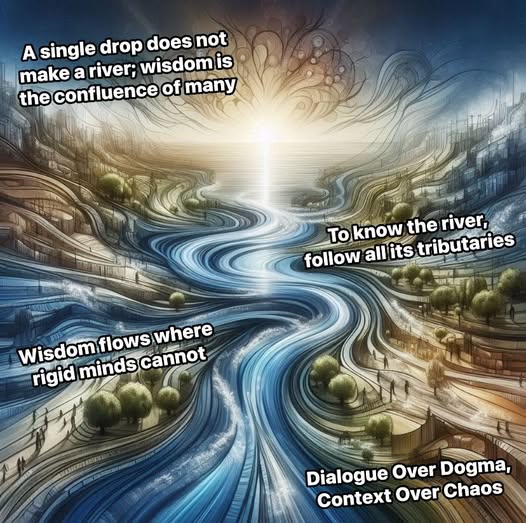
Kavi observed that humanity’s gravest errors arise not from ignorance, but from the arrogance of oversimplification—a refusal to honor the complexity of systems, beliefs, and realities. He taught that truth is a mosaic, not a monolith, and that reducing multifaceted concepts to singular narratives breeds extremism, division, and collapse. Like a gardener who mistakes one flower for the entire meadow, those who conflate part with whole cultivate deserts of dogma.
The Reductionist Extremism Dilemma
Kavi diagnosed three crises born from overgeneralizing narrow concepts:
- Context Collapse: Applying ideas beyond their intended scope, distorting their purpose.
- Religious: Framing Islam solely as political ideology (e.g., ISIS), Judaism as nationalism (e.g., extremist settlers), or Hinduism as cultural supremacy (e.g., Hindutva).
- Secular: Reducing democracy to mere elections while ignoring civic participation and justice.
- Personal: Defining self-worth entirely through career success, neglecting health and relationships.
- Ideological Monoculture: Enforcing a single lens to interpret dynamic systems.
- International: Blaming economic crises solely on external forces (e.g., tariffs as cure-alls), ignoring corruption or innovation deficits.
- Workplace: Attributing company failures exclusively to market trends, dismissing leadership flaws.
- Personal: Viewing mental health struggles purely through genetics, ignoring trauma or environment.
- Scapegoat Societies: Assigning systemic failures to simplified villains.
- International: Politicians scapegoating immigrants for economic woes, fueling xenophobia.
- Workplace: Managers blaming underperforming teams rather than flawed processes.
- Personal: Parents attributing family strife to one “problem child,” ignoring relational dynamics.
Kavi’s Insight:
“A single note cannot compose a symphony. To reduce truth to a slogan is to silence its song.”
The Framework for Contextual Wisdom
To combat reductionism, Kavi prescribed:
- Context Mapping (Reclaiming Nuance)
- Tool: “The Mosaic Lens”—Interactive platforms where users dissect concepts into interconnected components.
- Religious: Quranic verses analyzed alongside historical context, ethical principles, and mystical traditions (e.g., Sufism).
- Economic: AI models visualizing how tariffs interact with labor laws, innovation, and global trade.
- Personal: Apps tracking how habits (e.g., exercise) affect mood, relationships, and productivity.
- Ideological Biodiversity (Cultivating Multiple Perspectives)
- Practice: “The Council of Contrarians”—Decision-making bodies must include dissenters (e.g., atheists in religious councils, environmentalists in corporate boards).
- International: UN panels pairing nationalist and globalist thinkers to co-design policies.
- Workplace: “Devil’s Advocate Rotations” ensuring all strategies face rigorous critique.
- Personal: Families host “Perspective Dinners” inviting guests with opposing worldviews.
- Systems Alchemy (From Blame to Interdependence)
- Policy: “Root Cause Mandates”—Laws requiring governments/companies to address three systemic factors behind any crisis.
- Example: Poverty alleviation via education and healthcare and infrastructure.
- Ritual: “The Web Weaving Ceremony”—Communities physically map connections (e.g., yarn linking “tariffs” to “local jobs” and “environmental costs”).
The Lasting Impact
Kavi’s followers transformed dogma into dialogue:
- The Interfaith Mosaic Project: Formerly warring religious leaders co-authored texts acknowledging each faith’s pluralism, reducing sectarian violence by 45%.
- The Holonomic Corporate Charter: Firms like Unilever tied executive pay to multi-factor success metrics (employee well-being, sustainability, profit), ending scapegoating.
- The Family Systems Movement: Therapies addressing family dynamics (not “problem individuals”) cut divorce rates and teen rebellion.
Proverbs:
- “A single thread cannot clothe the world.”
- “Beware the man who sells you a single key to every lock.”
Kavi’s Final Lesson
“Truth is a river with countless tributaries. To drink from one and claim to know the whole is to die of thirst. Let us be cartographers of complexity, not crusaders of reduction. For when we honor the mosaic, we find that the political, the spiritual, and the personal are but colors in the same spectrum—each vital, none sufficient. The path to peace is paved not with simplicity, but with the courage to hold contradictions and still act with grace.”
This pattern cements Kavi as humanity’s architect of nuance, proving that wisdom lies in embracing the “and,” not the “or.” By rejecting reductionism, we transform extremism into equilibrium—one context-aware choice at a time.

